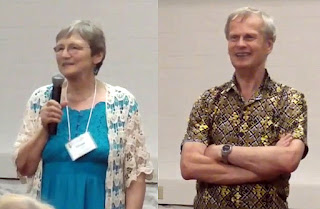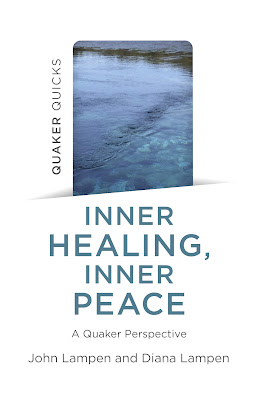As writers, Diana and John Lampen have an amazing ability to combine clarity, simplicity, practicality, on the one hand, and such sublime intangibles as mystery, joy, and beauty, on the other. This is certainly the case, to our immense gain, with their new book in the "Quaker Quicks" series, Inner Healing, Inner Peace: A Quaker Perspective.
In a way, the Lampens remind me of explorers—those remarkable people who have gone to distant and difficult places, to the polar regions, or deep underwater, or to the moon, with results that enriched our knowledge and our spiritual resources. Likewise, John and Diana, individually and together, have experienced a range of challenging situations that give them great credibility in talking about healing and peace.
They can speak from decades of experience with teenagers with emotional problems and long-termers in prisons, the urban warfare of "the Troubles" in Northern Ireland, the consequences of Chernobyl for a whole generation of children in Belarus, conflict in South Africa and Uganda, and many years of teaching nonviolent approaches to conflict in these settings and more.
There is, however, no heroic pose in their stories! Whether or not you have lived through similar dramatic settings, some of the most powerful stories told by John and Diana come from their own friends, families, colleagues, from those ground-level situations that happen anywhere to any of us: trauma, betrayal, resentment, anxiety, fear, and the ultimate fear of dying.
Among the obstacles to tranquillity are the unhealed hurts, wounds and scars within us. These may include bereavements, problems in our immediate relationships, or memories with which one cannot come to terms. One may try not to dwell on these thoughts, but they can force themselves on one’s attention, preventing people from relaxing or getting to sleep. We believe people need to find some peace within before they can respond effectively to their external problems—whether by taking action or by accepting or enduring them.
 |
| Diana and John at Pendle Hill, 2015; screenshot from source. |
Everywhere the Lampens ministered, they were teaching and learning at the same time. Here, for example, is one of the things they learned about habitual violence from the prisoners they worked with:
These prisoners explained to us that the initial response to a provocation was not anger; it was a feeling of humiliation, hurt, need or fear. This made them feel weak and vulnerable which they found hard to tolerate, so their brain flashed into anger mode, replacing the powerless feeling with a surge of strength. This enabled them to transfer the humiliation onto their opponent, who became the victim of the crime. We asked them whether there was a short time when they could have prevented this short-circuit into anger and violence. “Yes,” said one, “there was a moment, but it was as thin as a cigarette paper.”
This brief book is saturated with spiritual wisdom, from Jesus, George Fox, John Woolman, Isaac Penington, Rufus Jones, and others familiar to most Quakers, and also from Carl Jung, Patanjali, Dai-En Bannage (a Buddhist monastic), Thich Nhat Hanh, to name a few. Most of the explicit Quaker content will feel very congenial to unprogrammed Quakers of the tradition most familiar in the the U.K, and Ireland, but it doesn't all fit that category:
Unlike reconciliation, forgiveness does not depend on the other person showing remorse for the way they have treated us, though when this happens it can help us to forgive. Indeed, it does not even need the presence of the other; we can forgive the dead for hurts they have caused. One can rightly urge two parties to be reconciled; but no one has the right to say you must forgive, except “that of God” in yourself. A Rwandan Quaker pastor told us how he was leading his congregation in prayer when he felt God was saying to him, “I’m not listening to you—I’m not even here.” “Where are you, Lord?” “I’m in your house, comforting your wife after what you said to her before you came to church.” He immediately told the congregation to continue the service, while he went home to ask for her forgiveness. He added that this gave him insight into the general need to forgive and be forgiven after the terrible events in his country.
As you can see, the Lampens have not imposed doctrinal tests on the people and teachings of this book. Formal theology is not this book's focus. Nor do they deal directly with the politics behind some of the crises in which they served as healers and learners. As they say, other books in the "Quaker Quicks" series deal with some of these questions directly.
The temptation I face right now is simply to give you major chunks from this beautiful book, rather than imposing my own words. I hope I've given you enough reasons to get copies for yourself, and, best of all, explore the practices Diana and John have provided. The book ends with a carefully chosen list of references and further reading, including the Pendle Hill Pamphlet by John Yungblut that I recommended recently.
Although I'd read books and articles by the Lampens before 2000 (I particularly remember John Lampen's Twenty Questions about Jesus), it was in that year that we first met them. They spent six weeks at our Friends meeting at the time, Reedwood Friends Church, as part of our Center for Christian Studies program that year. Among the gifts they gave us during their residency with us was Rex Ambler's "Experiment with Light" practice. The group that began then at Reedwood continues to this day.
Another network that the Lampens have drawn upon, with mutual benefit, is the Alternatives to Violence Project, mentioned several times in this book. Friends Peace Teams, whose Europe Group I serve on, also collaborates intensively with Alternatives to Violence.
More about Friends Peace Teams in the latest issue of Sierra-Cascades Yearly Meeting of Friends newsletter.
Beth Allison Barr continues to consider complementarian theology. (And ... her students convinced her to see the movie Barbie.)
Heather Cox Richardson: When did the Republicans' "devil's bargain" begin?
Mark Pratt-Russum: Troublemaking as self-discovery.
Sue Foley: "Queen Bee." Ottawa's Sue Foley has a unique ability to match voice and guitar.

No comments:
Post a Comment